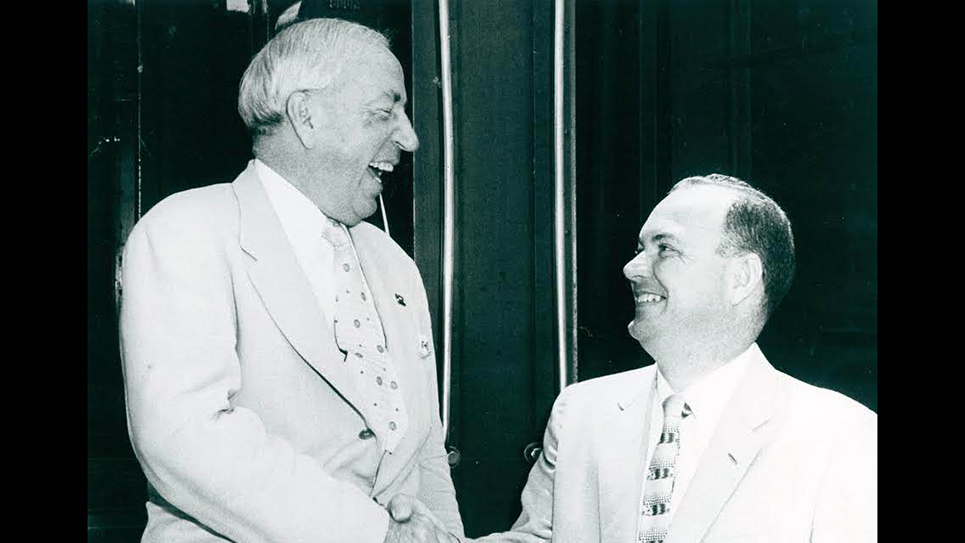Ordinarily I don’t care for end of the year reviews. To me they imply torpid journalism. But, I’m not a journalist; I’m a columnist. So here’s a look at the present instead of the past.
Actually, a “year in review” might not be too bad if full of pictures. However, my editor would faint if I sent a column comprised of pictures, even if they were of the “cute ones,” our family’s name for the grandkids. And I’ve come to realize I have a new job. I shepherd and love these citizens-to-be. And it’s good work, the best I’ve ever had.
Grandparenting is a noble profession. In times past, grandparents and their children and their children’s children used to live together. This has changed in modern times, and I’m not sure for the better. The Psalmist sang that children are gifts of the Lord. The Proverbist observed that grandchildren are crowns for the aging. No matter that my home is these days much like Clark Griswold’s home in Christmas Vacation, and it’s a blessing.
Humans are inquisitive creatures and resourceful. You may have heard of Jimmy Carter’s illness and treatment, and you may have noticed commercials on TV hawking new medications to treat cancer. As a Star Trek fan I love the introduction when Kirk says the starship Enterprise will “boldly go where no man has gone before.” These days the field of molecular biology is such a realm.
Cosmology is a science that looks outward into space. Quantum mechanics is a field that looks inward at the building blocks of matter. Humans reside between these two vast realms. We may not be able to see the quantum world or to the edge of the Universe, but we can see down to the molecules which comprise flesh and humans. Galen once operated on gladiators and described circulation. Scientists now study molecules which control our biology.
Cells interact through surface molecular receptors analogous to a lock and key. If the key fits, a cell will respond. An entire new class of diagnostic and therapeutic agents has been developed through research of cell interaction. These agents are called monoclonal antibodies.
Humans produce five classes of antibodies which are generated when they are exposed to anything foreign such as bacteria or even pollen. Science now makes it possible to create specific antibodies to virtually any protein. This is done by injecting a mouse with the protein you desire an antibody against. Subsequently, the challenged mouse’s immune cells are harvested and fused with perpetually replicating myeloma cells. Finally, the hybrid cells are grown in a selective medium which isolates the desired antibody producing cells. And as these cells proliferate the desired antibody is collected and purified.
Cancer cells grow uncontrollably. These cells can be killed with radiation or standard cytotoxic chemotherapy. The problem is these modalities kill healthy cells as well as cancer cells and produce lots of side effects. Wouldn’t it be great to redirect or turn on the patient’s own immune system to fight the cancer? This can be done by identifying a specific protein on tumor cells and giving cancer patients a specific manufactured antibody that targets the tumor protein. Monoclonal antibodies are the new class of “designer drugs” that are increasingly available for cancer therapy. And these agents cause fewer side effects. But they are very expensive. There are even two new cholesterol lowering monoclonal antibodies to target which inhibit a specific cholesterol enzyme.
Keeping up with the advances in medicine, and especially the new frontier of cellular biology, is challenging. A dear friend of mine has Crohn’s disease, an inflammatory bowel condition. A recent update in the NEJM on immuno-biology of the gut caught my curious eye. For a long time scientists have understood how our own immune systems recognize normal cells and don’t attack them. Researchers then asked why does our immune system tolerate the huge number of foreign bacteria in our gut? I learned that Crohn’s disease, like ulcerative colitis, is now considered a “dysbiosis.” It appears that patients with inflammatory bowel disease genetically lack a subpopulation of immune cells that limits response to gut bacteria. Apparently my friend’s body is reacting to her gut bacteria and it shouldn’t. I’ll tell her to have a talk with her colon the next time I see her.
I hesitate mentioning the following update. Since this is a family paper, I want to warn readers that they should snatch the Focus from any minors in the household. Many years ago I ran something like a book club for doctors where we discussed medical journals. I once presented a review on human sexuality, and it was the only time that the doctors, and subsequently their spouses, asked for copies of the article and my research notes.
You may recall the classic studies of Masters and Johnson who described sexual arousal, orgasm and recovery. It turns out their research better describes men than women. Women are more complicated and are stimulated more by emotional connection, whereas men respond more to visual imagery. Furthermore, it has to be the right place and time for a woman, who then makes a decision of “yes” or “no” before allowing things to proceed along the Masters and Johnson physiological response. If this is true, one can better comprehend the allegations of rape on college campuses these days.
Now consider the drug flibanserin recently released by the FDA to treat low libido in women. The drug effects serotonin, a neurotransmitter that binds to cellular receptors, like a key in a lock. Serotonin is also modulated by Prozac and related medications. No one knows why flibanserin improves sexual drive in women.
I’ve learned to be cautious with new therapies, unless, of course, there is no alternative. In fact, Ferguson’s rule number four is “not to be the first on the block to try a new medication, nor last in the neighborhood.” So, I doubt I’ll be giving shots of the new cholesterol medications anytime soon or prescribing flibanserin next week. However, I’m already using monoclonal antibody therapy. I wonder what “presents” 2016 will bring?






